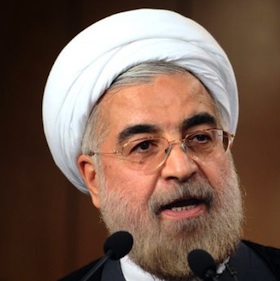Iranian President Hassan Rohani’s first speech at the United Nations General Assembly went off seemingly without a hitch, delivering a reasoned call for diplomacy and mutual respect while faulting the international sanctions against his nation, attributing them to “war-mongering pressure groups.”
 Rohani’s speech reiterated calls for cooperation, disavowing the notion of Iran ever acquiring nuclear weapons and calling for “immediate, results-oriented” talks aimed at ending sanctions and resolving Western complaints about the nation’s civilian nuclear program.
Rohani’s speech reiterated calls for cooperation, disavowing the notion of Iran ever acquiring nuclear weapons and calling for “immediate, results-oriented” talks aimed at ending sanctions and resolving Western complaints about the nation’s civilian nuclear program.
A pretty straightforward speech, and met with the usual official Israeli “walk-out” to express their displeasure at Iran in general, and was followed up with hawkish officials in the US and Israel condemning Rohani in an attempt to distract attention from the content of the speech and the prospect of diplomacy, and instead focus on the notion that Iran is playing some sort of trick.
Rep. Ed Royce (R – CA) quickly lashed the speech, saying Rohani was a “very clever fellow” and that he was plotting to acquire nuclear weapons under the guise of talks. He went on to falsely claim Iran was enriching uranium to nuclear weapons levels and making miniaturized warheads, both totally unsubstantiated allegations. He faulted EU support for Iran talks, saying they “got played” and warning that Rohani would similarly “play” the US if talks were agreed to.
Rep. Mike Rogers (R – MI) took a similar position in opposition to the deal, echoing Israeli claims that it is “too late” for negotiations now that Iran’s newly elected president wants to talk. Rogers similarly, and incorrectly, claimed Iran is escalating its enrichment, when in fact Iran’s civilian enrichment program is starting to phase out 20 percent uranium, having created enough to fuel its medical isotope reactor for the foreseeable future.


